- Home
- Neal Stephenson
Snow Crash Page 32
Snow Crash Read online
Page 32
“Gurov?”
“Yeah. One of the Refus who came over the Date-line from the Soviet Union. Former KGB general turned religious fanatic. He was kind of like the Minister of Defense for the government that the Orthos set up. So Gurov opens the side door of the Airstream and lets us get a load of what's inside.”
“What was inside?”
“Well, mostly it was a bunch of equipment, you know, a portable generator, electrical wiring, a control panel, and so forth. But in the middle of the trailer, there's this big black cone sitting on the floor. About the shape of an ice cream cone, except it's about five feet long and it's smooth and black. And I asked what the hell is that thing. And Gurov says, that thing is a ten-megaton hydrogen bomb we scavenged from a ballistic missile. A city-buster. Any more questions?”
“So you capitulated.”
“Couldn't do much else.”
“Do you know how the Orthos came to be in possession of a hydrogen bomb?”
Chuck Wrightson clearly knows. He sucks in his deepest breath of the evening, lets it out, shakes his head, staring off over Hiro's shoulder. He takes a couple of nice long swigs from his glass of beer.
“There was a Soviet nuclear-missile submarine. The commander was named Ovchinnikov. He was religiously faithful, but he wasn't a fanatic like the Orthos. I mean, if he had been a fanatic they wouldn't have given him command of a nuclear-missile submarine, right?”
“Supposedly.”
“You had to be psychologically stable. Whatever that means. Anyway, after things fell apart in Russia, he found himself in possession of this very dangerous weapon. He made up his mind that he was going to offload all of the crew and then scuttle it in the Marianas Trench. Bury all those weapons forever.
“But, somehow, he was persuaded to use this submarine to help a bunch of the Orthos escape to Alaska. They, and a lot of other Refus, had started flocking to the Bering coast. And the conditions in some of these Refu camps were pretty desperate. It's not like a lot of food can be grown in that area, you know. These people were dying by the thousands. They just stood on the beaches, starving to death, waiting for a ship to come.
“So Ovchinnikov let himself be persuaded to use his submarine—which is very large and very fast—to evacuate some of these poor Refus to TROKK.
“But, naturally, he was paranoid about the idea of letting a whole bunch of unknown quantities onto his ship. These nuke-sub commanders are real security freaks, for obvious reasons. So they set up a very strict system. All the Refus who were going to get on the ship had to pass through metal detectors, had to be inspected. Then they were under armed guard all the way across to Alaska.
“Well, the Stern Orthos have this guy named Raven—”
“I'm familiar with him.”
“Well, Raven got onto that nuclear submarine.”
“Oh, my God.”
“He got over to the Siberian coast somehow—probably surfed across in his fucking kayak.”
“Surfed?”
“That's how the Aleuts get between islands.”
“Raven's an Aleut?”
“Yeah. An Aleut whale killer. You know what an Aleut is?”
“Yeah. My Dad knew one in Japan,” Hiro says. A bunch of Dad's old prison-camp tales are beginning to stir in Hiro's memory, working their way up out of deep, deep storage.
“The Aleuts just paddle out in their kayaks and catch a wave. They can outrun a steamship, you know.”
“Didn't know that.”
“Anyway, Raven went to one of these Refu camps and passed himself off as a Siberian tribesman. You can't tell some of those Siberians apart from our Indians. The Orthos apparently had some confederates in these camps who bumped Raven up to the head of the line, so he got to be on the submarine.”
“But you said there was a metal detector.”
“Didn't help. He uses glass knives. Chips them out of plate glass. It's the sharpest blade in the universe, you know.”
“Didn't know that either.”
“Yeah. The edge is only a single molecule wide. Doctors use them for eye surgery—they can cut your cornea and not leave a scar. There's Indians who make a living doing that, you know. Chipping out eye scalpels.”
“Well, you learn something new every day. That kind of a knife would be sharp enough to go through bullet-proof fabric, I guess,” Hiro says.
Chuck Wrightson shrugs. “I lost track of the number of people Raven snuffed who were wearing bulletproof fabric.”
Hiro says, “I thought he must be carrying some kind of high-tech laser knife or something.”
“Think again. Glass knife. He had one on board the submarine. Either smuggled it on board with him, or else found a chunk of glass on the submarine and chipped it out himself.”
“And?”
Chuck gets his thousand-yard stare again, takes another slug of beer. “On a sub, you know, there's no place for things to drain to. The survivors claimed that the blood was knee-deep all through the submarine. Raven just killed everyone. Everyone except the Orthos, a skeleton crew, and some other Refus who were able to barricade themselves in little compartments around the ship. The survivors say,” Chuck says, taking another swig, “that it was quite a night.”
“And he forced them to steer the submarine into the hands of the Orthos.”
“To their anchorage off Kodiak,” Chuck says. “The Orthos were all ready. They had put together a crew of ex-Navy men, guys who had worked on nuke subs in the past—X-rays, they call them—and they came and took the sub over. As for us, we had no idea that any of this had happened. Until one of the warheads showed up in our goddamn front yard.”
Chuck glances up above Hiro's head, noticing someone. Hiro feels a light tap on his shoulder. “Excuse me, sir?” a man is saying. “Pardon me for just a second?”
40
Hiro turns around. It's a big porky white man with wavy, slicked-back red hair and a beard. He's got a baseball cap perched on top of his head, tilted way back to expose the following words, tattooed in block letters across his forehead:
MOOD SWINGS
RACIALLY INSENSITIVE
Hiro is looking up at all of this over the curving horizon of the man's flannel-clad belly.
“What is it?” Hiro says.
“Well, sir, I'm sorry to disturb you in the middle of your conversation with this gentleman here. But me and my friends were just wondering. Are you a lazy shiftless watermelon-eating black-ass nigger, or a sneaky little v.d.-infected gook?”
The man reaches up, pulls the brim of his baseball cap downward. Now Hiro can see the Confederate flag printed on the front, the embroidered words “New South Africa Franchulate #153.”
Hiro pushes himself up over the table, spins around, and slides backward on his ass toward Chuck, trying to get the table between him and the New South African. Chuck has conveniently vanished, so Hiro ends up standing with his back comfortably to the wall, looking out over the bar.
At the same time, a dozen or so other men are standing up from their tables, forming up behind the first one in a grinning, sunburned phalanx of Confederate flags and sideburns.
“Let's see,” Hiro says, “is that some kind of a trick question?”
There are a lot of Towne Halls in a lot of Snooze 'n' Cruise franchises where you have to check your weapons at the entrance. This is not one of them.
Hiro isn't sure if that is bad or good. Without weapons, the New South Africans would just beat the crap out of him. With weapons, Hiro can fight back, but the stakes are higher. Hiro is bulletproof up to his neck, but that just means the New South Africans will all be going for a head shot. And they pride themselves on marksmanship. It is a fetish with them.
“Isn't there an NSA franchise down the road?” Hiro says.
“Yeah,” says the point man, who has a long, spreading body and short stumpy legs. “It's heaven. It really is. Ain't no place on earth like a New South Africa.”
“Well, then if you don't mind my asking,” Hiro say
s, “if it's so damn nice, why don't y'all go back to your egg sac and hang out there?”
“There is one problem with New South Africa,” the guy says. “Don't mean to sound unpatriotic, but it's true.”
“And what is that problem?” Hiro says.
“There's no niggers, gooks, or kikes there to beat the shit out of.”
“Ah. That is a problem,” Hiro says. “Thank you.”
“For what?”
“For announcing your intentions—giving me the right to do this.”
Then Hiro cuts his head off.
What else can he do? There are at least twelve of them. They have made a point of blocking the only exit. They have just announced their intentions. And presumably they are all carrying heat. Besides, this kind of thing is going to happen to him about every ten seconds when he's on the Raft.
The New South African has no idea what's coming, but he starts to react as Hiro is swinging the katana at his neck, so he is flying backward when the decapitation occurs. That is good, because about half his blood supply comes lofting out the top of his neck. Twin jets, one from each carotid. Hiro doesn't get a drop on himself.
In the Metaverse, the blade just passes right through, if you swing it quickly enough. Here in Reality, Hiro's expecting a powerful shock when his blade hits the New South African's neck, like when you hit a baseball the wrong way, but he hardly feels a thing. It just goes right through and almost swings around and buries itself in the wall. He must have gotten lucky and hit a gap between vertebrae. Hiro's training comes back to him, oddly. He forgot to squeeze it off, forgot to stop the blade himself, and that's bad form.
Even though he's expecting it, he's startled for a minute. This sort of thing doesn't happen with avatars. They just fall down. For an astonishingly long time, he just stands there and looks at the guy's body. Meanwhile, the airborne cloud of blood is seeking its level, dripping from the hung ceiling, spattering down from shelves behind the bar. A wino sitting there nursing a double shot of vodka shakes and shivers, staring into his glass at the galactic swirl of a trillion red cells dying in the ethanol.
Hiro swaps a few long glances with the New South Africans, like everyone in the bar is trying to come to a consensus as to what will happen next. Should they laugh? Take a picture? Run away? Call an ambulance?
He makes his way around toward the exit by running across people's tables. It is rude, but other patrons scoot back, some of them are quick enough to snatch their beers out of his way, and no one gives him any hassles. The sight of the bare katana inspires everyone to a practically Nipponese level of politeness. There are a couple more New South Africans blocking Hiro's way out, but not because they want to stop anyone. It's just where they happen to be standing when they go into shock. Hiro decides, reflexively, not to kill them.
And Hiro is off into the lurid main avenue of the Towne Hall, a tunnel of flickering and pulsating loglo through which black creatures sprint like benighted sperm up the old fallopians, sharp angular things clenched in their hands. They are The Enforcers. They make the average MetaCop look like Ranger Rick.
Gargoyle time. Hiro switches everything on: infrared, millimeter-wave radar, ambient-sound processing. The infrared doesn't do much in these circumstances, but the radar picks out all the weapons, highlights them in The Enforcers' hands, identifies them by make, model, and ammunition type. They're all fully automatic.
But The Enforcers and the New South Africans don't need radar to see Hiro's katana with blood and spinal fluid running down the blade.
The music of Vitaly Chernobyl and the Meltdowns is blasting through bad speakers all around him. It is their first single to hit the Billboard charts, entitled “My Heart Is a Smoking Hole in the Ground.” The ambient sound processing cuts it to a more reasonable level, evens out the nasty distortion from the speakers so that he can hear his roommate singing more clearly. Which makes it all particularly surreal. It just goes to show that he's out of his element. Doesn't belong here. Lost in the biomass. If there was any justice, he could jump into those speakers and trace up the wires like a digital sylph, follow the grid back to L.A., where he belongs, there on top of the world, where everything comes from, buy Vitaly a drink, crawl into his futon.
He stumbles forward helplessly as something terrible happens to his back. It feels like being massaged with a hundred ballpeen hammers. At the same time, a yellow sputtering light overrides the loglo. A screaming red display flashes up on the goggles informing him that the millimeter-wave radar has noticed a stream of bullets headed in his direction and would you like to know where they came from, sir?
Hiro has just been shot in the back with a burst of machine-gun fire. All of the bullets have slapped into his vest and dropped to the floor, but in doing so they have cracked about half of the ribs on that side of his body and bruised a few internal organs. He turns around, which hurts.
The Enforcer has given up on bullets and whipped out another weapon. It says so right on Hiro's goggles: PACIFIC ENFORCEMENT HARDWARE, INC. MODEL SX-29 RESTRAINT PROJECTION DEVICE (LOOGIE GUN). Which is what he should have used in the first place.
You can't just carry a sword around as an empty threat. You shouldn't draw it, or keep it drawn, unless you intend to kill someone. Hiro runs toward The Enforcer, raising the katana to strike. The Enforcer does the proper thing, namely, gets the hell out of his way. The silver ribbon of the katana shines up above the crowd. It attracts Enforcers and repels everyone else, so as Hiro runs down the center of the Towne Hall, he has no one in front of him and many shiny dark creatures behind him.
He turns off all of the techno-shit in his goggles. All it does is confuse him; he stands there reading statistics about his own death even as it's happening to him. Very post-modern. Time to get immersed in Reality, like all the people around him.
Not even Enforcers will fire their big guns in a crowd, unless it's point-blank range, or they're in a really bad mood. A few loogies shoot past Hiro, already so spread out as to be nothing more than an annoyance, and splat into bystanders, wrapping them in sticky gossamer veils.
Somewhere between the 3-D video-game arcade and the display window full of terminally bored prostitutes, Hiro's eyes clear up and he sees a miracle: the exit of the inflatable dome, where the doors exhale a breeze of synthetic beer breath and atomized body fluids into the cool night air.
Bad things and good things are happening in quick succession. The next bad thing happens when a steel grate falls down to block the doors.
What the hell, it's an inflatable building. Hiro turns on the radar just for a moment and the walls seem to drop away and become invisible; he's seeing through them now, into the forest of steel outside. It doesn't take long to locate the parking lot where he left his bike, supposedly under the protection of some armed attendants.
Hiro fakes toward the whorehouse, then cuts directly toward an exposed section of wall. The fabric of the building is tough, but his katana slices a six-foot rent through it with a single gliding motion, and then he's outside, spat out of the hole on a jet of fetid air.
After that—after Hiro gets onto his motorcycle, and the New South Africans get into their all-terrain pickups, and The Enforcers get into their slick black Enforcer mobiles, and they all go screaming out onto the highway—after that it's just a chase scene.
41
Y.T. has been to some unusual places in her career. She has the visas of some three dozen countries laminated onto her chest. And on top of the real countries she has picked up and/or delivered to such charming little vacation spots as the Terminal Island Sacrifice Zone and the encampment in Griffith Park. But the weirdest job of all is this new one: someone wants her to deliver some stuff to the United States of America. Says so right there on the job order.
It's not much of a delivery, just a legal-size envelope.
“You sure you don't just want to mail this?” she asks the guy when she picks it up. It's one of these creepy office parks out in the Burbs. Like a Burbclave for worthl
ess businesses that have offices and phones and stuff but don't actually seem to do anything.
It's a sarcastic question, of course. The mail doesn't work, except in Fedland. All the mailboxes have been unbolted and used to decorate the apartments of nostalgia freaks. But it's also kind of a joke, because the destination is, in fact, a building in the middle of Fedland. So the joke is: If you want to deal with the Feds, why not use their fucked-up mail system? Aren't you afraid that by dealing with anything as incredibly cool as a Kourier you will be tainted in their eyes?
“Well, uh, the mail doesn't come out here, does it?” the guy says.
No point in describing the office. No point in even allowing the office to even register on her eyeballs and take up valuable memory space in her brain. Fluorescent lights and partitions with carpet glued to them. I prefer my carpet on the floor, thank you. A color scheme. Ergonomic shit. Chicks with lipstick. Xerox smell. Everything's pretty new, she figures.
The legal envelope is resting on the guy's desk. Not much point in describing him, either. Traces of a southern or Texan accent. The bottom edge of the envelope is parallel to the edge of the desk, one-quarter inch away from it, perfectly centered between the left and right sides. Like he had a doctor come in here and put it on the desk with tweezers. It is addressed to: ROOM 968A, MAIL STOP MS-1569835, BUILDING LA-6, UNITED STATES OF AMERICA.
“You want a return address on this?” she says.
“That's not necessary.”
“If I can't deliver it, there's no way I can get it back to you, because these places all look the same to me.”
“It's not important,” he says. “When do you think you'll get it there?”
“Two hours max.”
“Why so long?”
“Customs, man. The Feds haven't modernized their system like everyone else.” Which is why most Kouriers will do anything to avoid delivering to Fedland. But it's a slow day today, Y.T. hasn't been called in to do any secret missions for the Mafia yet, and maybe she can catch Mom on her lunch break.

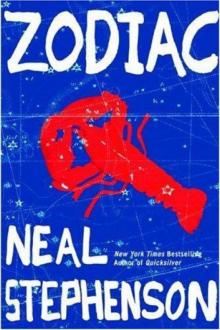 Zodiac: The Eco-Thriller
Zodiac: The Eco-Thriller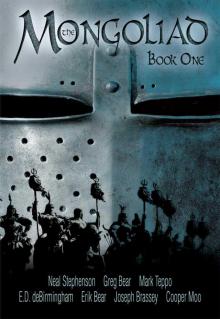 The Mongoliad: Book One
The Mongoliad: Book One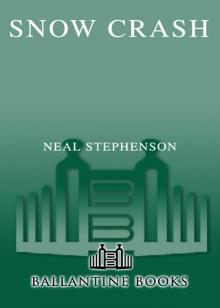 Snow Crash
Snow Crash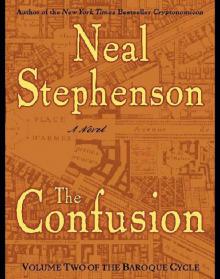 The Confusion: Volume Two of the Baroque Cycle
The Confusion: Volume Two of the Baroque Cycle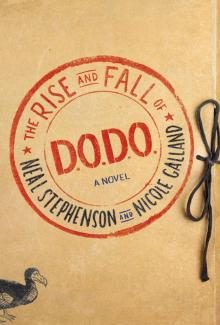 The Rise and Fall of D.O.D.O.
The Rise and Fall of D.O.D.O.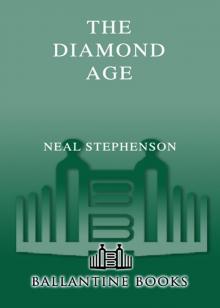 The Diamond Age: Or, a Young Lady's Illustrated Primer
The Diamond Age: Or, a Young Lady's Illustrated Primer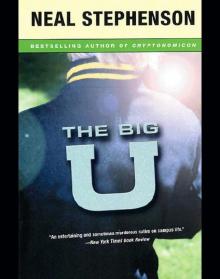 The Big U
The Big U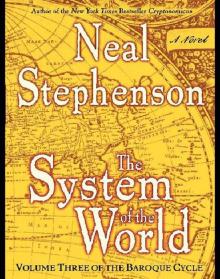 The System of the World: Volume Three of the Baroque Cycle
The System of the World: Volume Three of the Baroque Cycle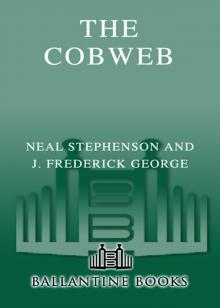 The Cobweb
The Cobweb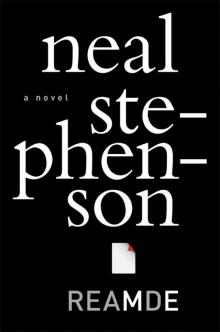 Reamde
Reamde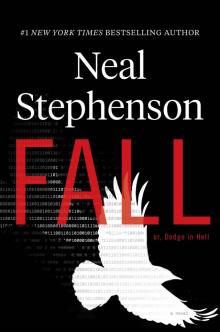 Fall; or, Dodge in Hell
Fall; or, Dodge in Hell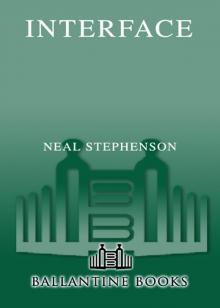 Interface
Interface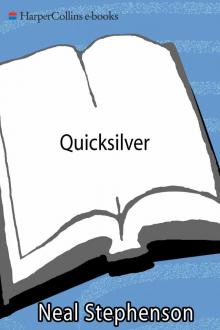 Quicksilver
Quicksilver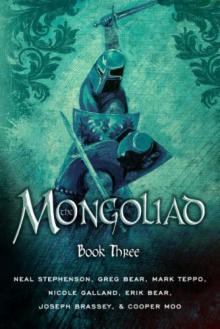 The Mongoliad: Book Three
The Mongoliad: Book Three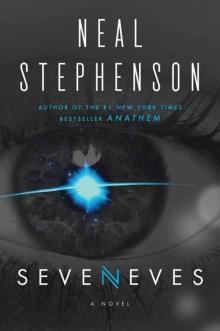 Seveneves
Seveneves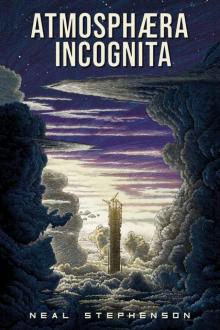 Atmosphæra Incognita
Atmosphæra Incognita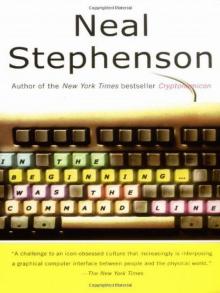 In the Beginning...Was the Command Line
In the Beginning...Was the Command Line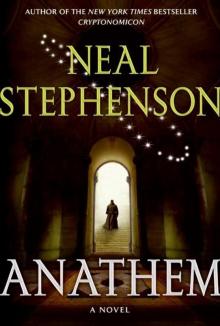 Anathem
Anathem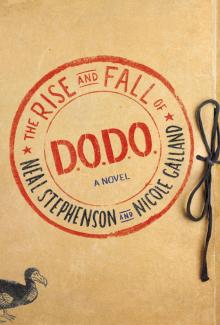 The Rise and Fall of D.O.D.O.: A Novel
The Rise and Fall of D.O.D.O.: A Novel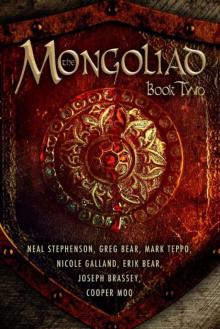 The Mongoliad: Book Two
The Mongoliad: Book Two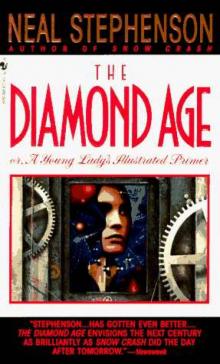 Diamond Age or a Young Lady's Illustrated Primer
Diamond Age or a Young Lady's Illustrated Primer THE System OF THE WORLD
THE System OF THE WORLD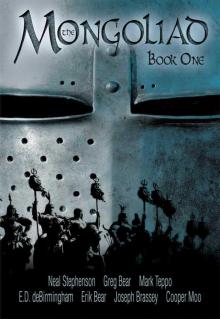 The Mongoliad: Book One tfs-1
The Mongoliad: Book One tfs-1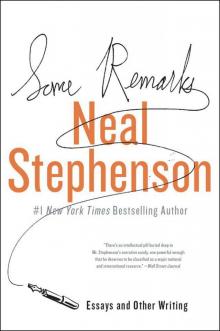 Some Remarks: Essays and Other Writing
Some Remarks: Essays and Other Writing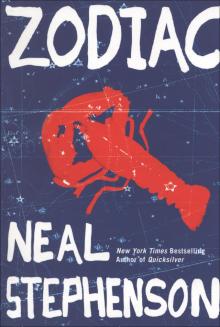 Zodiac
Zodiac Spew
Spew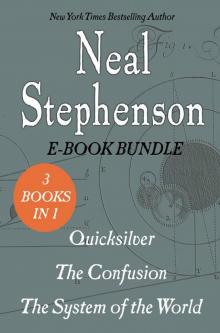 The Baroque Cycle: Quicksilver, the Confusion, and the System of the World
The Baroque Cycle: Quicksilver, the Confusion, and the System of the World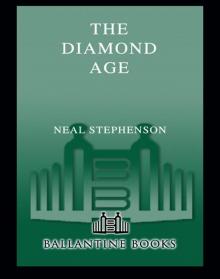 The Diamond Age
The Diamond Age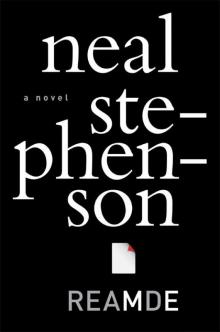 Reamde: A Novel
Reamde: A Novel In the Kingdom of Mao Bell
In the Kingdom of Mao Bell Mother Earth Mother Board
Mother Earth Mother Board Twelve Tomorrows - Visionary stories of the near future inspired by today's technologies
Twelve Tomorrows - Visionary stories of the near future inspired by today's technologies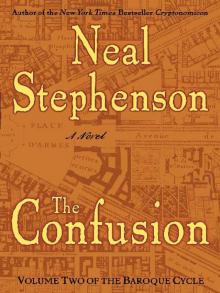 The Confusion
The Confusion The Great Simoleon Caper
The Great Simoleon Caper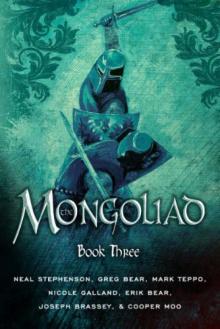 The Mongoliad: Book Three tfs-3
The Mongoliad: Book Three tfs-3